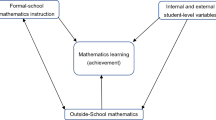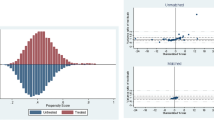Abstract
This paper investigates the effectiveness of private tutoring in Turkey. The authors introduce their study by providing some background information on the two major national examinations and three different kinds of tutoring. They then describe how they aimed to analyse whether attending private tutoring centres (PTCs) enhances Turkish students’ academic performance. By way of multiple linear regression analysis, their study sought to evaluate whether the impact of private tutoring varies in different subject areas, taking into account several student-related characteristics such as family and academic backgrounds as well as interest in and perception of academic success. In terms of subject areas, the results indicate that while private tutoring does have a positive impact on academic performance in mathematics and Turkish language, this is not the case in natural sciences. However, as evidenced by the effect sizes, these impacts are rather small compared to the impacts of other variables such as interest in and perception of academic success, high school graduation fields of study, high school cumulative grade point average (CGPA), parental education and students’ sociocultural background. While the authors point out that more research on the impact of further important variables needs to be done, their view is that school seems to be an important factor for determining students’ academic performance.
Résumé
Le soutien scolaire privé améliore-t-il les performances des étudiants ? Les résultats en Turquie – Les auteurs de cet article explorent l’efficacité des cours particuliers dispensés en Turquie. Ils présentent leur étude en fournissant quelques informations de fond sur les deux principaux examens nationaux et trois formes différentes de soutien scolaire. Ils décrivent ensuite l’approche qu’ils ont adoptée pour déterminer si la fréquentation des centres privés de soutien scolaire améliore les performances des étudiants turcs. Au moyen d’une analyse par régression linéaire multiple, ils ont cherché à établir si l’impact du soutien privé varie en fonction des disciplines, en intégrant plusieurs critères relatifs aux étudiants tels que le contexte familial et universitaire ainsi que l’intérêt et la perception pour le succès universitaire. En ce qui concerne les disciplines, les résultats indiquent que si le soutien privé a effectivement un impact positif sur les performances universitaires en mathématiques et en langue turque, il n’en est pas le cas dans le domaine des sciences naturelles. Néanmoins, comme le démontrent les tailles d’effet, ces impacts sont plutôt modestes, comparés à ceux d’autres variables telles que l’intérêt et la perception pour le succès universitaire, les matières d’examen pour le diplôme des études secondaires, la moyenne pondérée cumulative (MPC) obtenue au baccalauréat, le niveau d’instruction des parents et le contexte socioculturel de l’étudiant. Les auteurs signalent qu’une étude complémentaire serait nécessaire pour examiner l’impact d’autres variables significatives, mais émettent d’ores et déjà le point de vue que l’école semble être un facteur important pour déterminer les performances des étudiants.
Similar content being viewed by others
Notes
There are several types of high schools in Turkey. Science high schools, for example, focus on subjects related to science, mathematics and technology. Anatolian high schools teach some subjects through English (or sometimes German) as language of instruction. Private high schools, which are very competitive, charge high tuition fees.
Students who constituted the sample of the present study started primary school when they were six years old. After five years of primary education and three years of lower secondary school (both of which are compulsory), 15-year-olds who wished to continue formal education entered high school (upper secondary), which they attended for four years (plus sometimes an extra year of language study). Higher education then consists of either four years at University, or two years at a Higher Vocational School.
The Turkish Higher Education Entrance Examination (HEEE) is held every year in early summer in two stages. To pass the first stage, high school graduates have to answer 160 multiple-choice questions in 160 minutes. The exam form includes four subjects, namely Turkish, social sciences, mathematics and natural sciences as separate subtests. Students who pass this exam take the second-stage exam, by choosing among five tests in different subject areas depending on their aptitude and the subject areas they are hoping to study at university. Each test has different number of items in multiple-choice format and is subject to a different timespan for completion. Students who fail this exam can repeat it the following year.
References
Abu-Hilal, M. M. (2000). A structural model for predicting mathematics achievement: Its relation with anxiety and self-concept in mathematics. Psychological Reports, 86(3), 835–847.
Banerjee, A. V., Cole, S., Duflo, E., & Linden, L. (2007). Remedying education: Evidence from two randomized experiments in India. Quarterly Journal of Economics, 122(3), 1235–1264.
Berberoğlu, G. (2010). Ölçme ve Değerlendirmenin Uygulamaya Yansıyan Boyutları [Dimensions of measurement and evaluation which are reflected to educational practices]. Cito Eğitim: Kuram ve Uygulama, 1(10), 10–14.
Berberoğlu, G., Demirtaşlı, N., İş Güzel, C., Arıkan, S., & Özgen Tuncer, C. (2010). Okul Dışı Etmenlerin Öğrenci Başarısı ile İlişkisi [Effects of out-of-school factors on students’ achievement]. Cito Eğitim: Kuram ve Uygulama., 1(7), 28–38.
Bray, M. (2006). Private supplementary tutoring: Comparative perspectives on patterns and implications. Compare: A Journal of Comparative Education, 36(4), 515–530.
Bray, M. (2011). Does tutoring work? In M. Bray, The challenge of shadow education: Private tutoring and its implications for policy makers in the European Union (pp. 47–51). Brussels: European Commission. Accessed 5 December 2012 from http://www.nesse.fr/nesse/activities/reports/the-challenge-of-shadow-education-1.
Bray, M., Mazawi, A. E., & Sultana, R. G. (2013). Private tutoring across the Mediterranean: Power dynamics and implications for learning and equity. Rotterdam: Sense Publishers.
Briggs, D. C. (2001). The effect of admissions test preparation: Evidence from NELS: 88. Chance, 14(1), 10–18.
Buchmann, C. (2002). Getting ahead in Kenya: Social capital, shadow education, and achievement. In E. Hannum (Ed.) Schooling and social capital in diverse cultures. Research in the Sociology of Education series (Vol. 13, pp. 133–159). Bingley: Emerald.
Cheo, R., & Quah, E. (2005). Mothers, maids and tutors: An empirical evaluation of their effect on children’s academic grades in Singapore. Education Economics, 13(3), 269–285.
Choi, A., Calero., J. & Escardíbul, J.-O. (2011). Hell to touch the sky? Private tutoring and academic achievement in Korea. IEB Working Paper series No. 2011/10. Barcelona: Barcelona Institute of Economics (IEB).
Cohen, J. (1988). Statistical power analysis for the behavioral sciences (2nd ed.). Hillsdale, NJ: Lawrence Erlbaum Associates.
Cooper, S. E., & Robinson, D. A. G. (1991). The relationship of mathematics self efficacy beliefs to mathematics anxiety and performance. Measurement & Evaluation in Counseling & Development, 24(1), 4–11.
Dang, H.-A. (2007). The determinants and impact of private tutoring classes in Vietnam. Economics of Education Review, 26(6), 684–699.
Ferry, T. R., Fouad, N. A., & Smith, P. L. (2000). The role of family context in a social cognitive model for career-related choice behavior: A math and science perspective. Journal of Vocational Behavior, 57(3), 348–364.
Gök, F. (2010). Marketing hope: Private institutions preparing students for the university entrance examination in Turkey, In S. K. Amos (Ed.), International educational governance, international perspectives on education and society. International Perspectives on Education and Society series (Vol. 12, pp. 123–13). Bingley: Emerald.
Ha, T. T., & Harpham, T. (2005). Primary education in Vietnam: Extra classes and outcomes. International Education Journal, 6(5), 626–634.
Hackett, G., & Betz, N. E. (1989). An exploration of the mathematics self-efficacy mathematics performance correspondence. Journal for Research in Mathematics Education, 20(3), 261–273.
Hall, J. M., & Ponton, M. K. (2005). Mathematics self-efficacy of college freshman. Journal of Developmental Education, 28(3), 26–33.
Kuban, D. (2011). Dersane mi Istersiniz, Öğretim mi? [Would you like private tutoring or teaching?]. Cumhuriyet Bilim Teknik, 1282(2), 14.
Lavy, V., & Schlosser, A. (2005). Targeted remedial education for underperforming teenagers: Costs and Benefits. Journal of Labor Economics, 23(4), 839–874.
Lee, J.-T., Kim, Y.-B., & Yoon, C.-H. (2004). The effects of pre-class tutoring on student achievement: challenges and implications for public education in Korea. KEDI Journal of Educational Policy, 1(1), 25–42.
Marsh, H. W. (1986). Verbal and math self-concepts: An internal/external frame of reference model. American Educational Research Journal, 23(1), 129–149.
Meece, J. L., Wigfield, A., & Eccles, J. S. (1990). Predictors of mathematics anxiety and its influence on young adolescents’ course enrollment intentions and performance in mathematics. Journal of Educational Psychology, 82(1), 60–70.
Mendes, A., Costa, J. A., Ventura, A., Azevedo, S., & Gouveia, A. (2013). Private tutoring in Portugal: Patterns and impact at different levels of education. In M. Bray, A. E. Mazawi, & R. G. Sultana (Eds.), Private tutoring across the Mediterranean: Power dynamics and implications for learning and equity (pp. 151–165). Rotterdam: Sense Publishers.
MoNE (Ministry of National Education). (2010). Ortaöğretim 2009 ÖBBS Raporu [Report on 2009 Assessment of Students Achievement in Secondary Education]. Ankara: Educational Research and Development Division.
MoNE (Ministry of National Education). (2011). National education statistics, formal education, 2010–2011. Ankara: Ministry of National Education.
MSPC (Measurement, selection and placement centre) (2008). Homepage. http://www.osym.gov.tr/ana-sayfa/1-0/20081110.html. Accessed 10 November 2008.
MSPC (Measurement, selection and placement centre) (2013). Homepage. http://www.osym.gov.tr/ana-sayfa/1-0/20130801.html. Accessed 1 August 2013.
O’Brien, V., Martinez-Pons, M., & Kopala, M. (1999). Mathematics self-efficacy, ethnic identity, gender, and career interests related to mathematics and science. The Journal of Educational Research, 92(4), 231–235.
OECD (Organisation for Economic Co-operation and Development). (2004). Learning for tomorrow’s world. Paris: OECD Publishing.
OECD (Organisation for Economic Co-operation and Development). (2011). Education at a glance 2011: OECD indicators. Paris: OECD Publishing.
Popa, S. (2007). Defensible spaces: Ideologies of professionalism and teacher’s work in the Romanian private tutoring system. Unpublished doctoral dissertation, University of Pittsburgh, Pittsburgh, PA.
Stevens, J. (1992). Applied multivariate statistics for the social sciences (2nd ed.). Hillsdale: Lawrence Erlbaum Associates, Publishers.
Suryadarma, D., Suryahadi, A., Sumarto, S., & Rogers, F. H. (2006). Improving student performance in public primary schools in developing countries: Evidence from Indonesia. Education Economics, 14(4), 401–429.
Tabachnick, G. B., & Fidell, S. N. (1996). Using multivariate statistics (3rd ed.). New York: Harper Collins College Publishing.
Tansel, A. & F. Bircan (2008). Private supplementary tutoring in Turkey: Recent evidence on its various aspects. IZA Discussion Paper No: 3471. Bonn, Germany: Forschungsinstitut zur Zukunft der Arbeit/Institute for the Study of Labor (IZA).
Tansel, A. (2013a). Supplementary education in Turkey: Recent developments and future prospects. In J. Aurini, S. Davies, & J. Dierkes (Eds.), Out of the shadows? An Introduction to world-wide supplementary education. International Perspectives on Education and Society series (Vol. 22, pp. 23–66). Bingley: Emerald.
Tansel, A. (2013b). Private tutoring and inequitable opportunities in Turkey: Challenges and policiy implications. In M. Bray, A. E. Mazawi, & R. G. Sultana (Eds.), Private tutoring across the Mediterranean: Power dynamics and implications for learning and equity (pp. 177–186). Rotterdam: Sense publishers.
Tansel, A & Bircan, F. (2005). Effect of private tutoring on university entrance examination performance in Turkey. IZA Discussion Paper No: 1609. Bonn, Germany: Forschungsinstitut zur Zukunft der Arbeit/Institute for the Study of Labor (IZA).
Tansel, A., & Bircan, F. (2006). Demand for education in Turkey: A tobit analysis of private tutoring expenditures. Economics of Education Review, 25(3), 303–313.
TED (Turkish Educational Society). (2005). Turkiye’de Üniversiteye Giriş Sistemi Araştırması ve Çözüm Önerileri [An Investigation of the Universty Entrance System in Turkey and Proposals for Solution]. Ankara: TED Publication.
Author information
Authors and Affiliations
Corresponding author
Rights and permissions
About this article
Cite this article
Berberoğlu, G., Tansel, A. Does private tutoring increase students’ academic performance? Evidence from Turkey. Int Rev Educ 60, 683–701 (2014). https://doi.org/10.1007/s11159-014-9436-y
Published:
Issue Date:
DOI: https://doi.org/10.1007/s11159-014-9436-y




